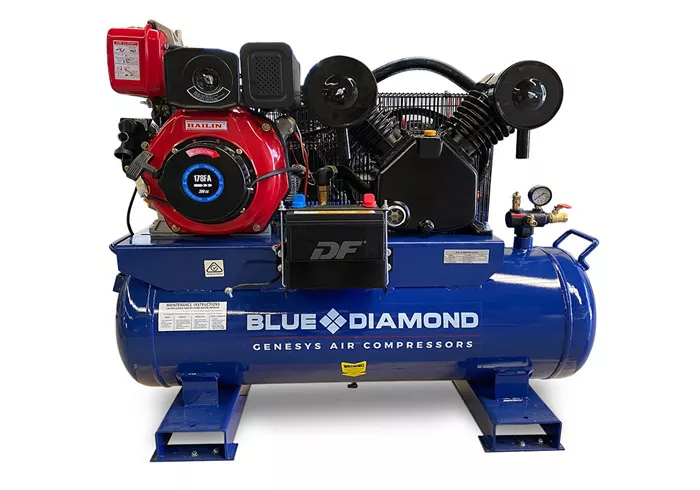Choosing the right air compressor for your needs is crucial to ensure efficiency, performance, and longevity. Whether you’re in a small workshop, a large manufacturing plant, or in the construction industry, selecting the correct type of air compressor can significantly impact your operations. This article will guide you through the different types of air compressors, their uses, and how to determine which one is best suited for your needs.
Introduction to Air Compressors
An air compressor is a machine that increases the pressure of air by reducing its volume. It stores the compressed air in a tank and releases it when needed. Air compressors are essential tools in many industries, from automotive repair to industrial manufacturing. They are used to power pneumatic tools, inflate tires, and even supply breathing air for divers.
Selecting the right compressor depends on various factors, such as the type of application, the tools you’ll be using, and the power supply available. A poor choice could lead to inefficiency, excessive energy consumption, or even equipment failure.
Types of Air Compressors
1. Reciprocating Air Compressors
Reciprocating compressors are one of the most common types of air compressors. They use a piston to compress air within a cylinder. This type of compressor is often used in small to medium-sized operations where high pressure and intermittent use are required.
Advantages:
- High pressure capabilities
- Relatively affordable
- Suitable for small to medium-sized operations
Disadvantages:
- Noisy
- Requires regular maintenance
- Not ideal for continuous operation
2. Rotary Screw Air Compressors
Rotary screw compressors are more efficient and are designed for continuous use. They use two interlocking screws to compress air. These compressors are often used in industries where constant, steady airflow is needed.
Advantages:
- Energy efficient
- Low maintenance
- Can run continuously without overheating
Disadvantages:
- More expensive than reciprocating compressors
- Larger and heavier
- May require special installation
3. Centrifugal Air Compressors
Centrifugal compressors are used in large industrial applications, such as power plants and refineries. They work by increasing the speed of air with a rotating impeller, then converting this kinetic energy into pressure.
Advantages:
- Suitable for high volume applications
- Provides consistent airflow
- Excellent for continuous operation
Disadvantages:
- High initial cost
- Complex maintenance
- Requires specific operational conditions
4. Diaphragm Air Compressors
Diaphragm compressors are typically used in laboratory and medical applications where pure, oil-free air is required. They operate by using a diaphragm to compress air in a chamber, preventing oil contamination.
Advantages:
- Provides oil-free air
- Quiet operation
- Small and compact
Disadvantages:
- Limited airflow capacity
- Not suitable for high-pressure applications
- Higher maintenance for long-term use
Factors to Consider When Choosing an Air Compressor
When selecting an air compressor, it’s essential to consider several factors to ensure it meets your needs efficiently.
1. Airflow Requirements (CFM)
The most critical factor in choosing an air compressor is the required airflow, measured in cubic feet per minute (CFM). This indicates how much air the compressor can deliver to your tools. If you’re using tools that require a constant supply of air, like pneumatic drills or spray guns, you’ll need to choose a compressor that can meet or exceed the required CFM.
2. Pressure Requirements (PSI)
Another important factor is the pressure required for your application, measured in pounds per square inch (PSI). Different tools require different PSI levels to operate effectively. For instance, an impact wrench might require a higher PSI than a spray painter.
3. Duty Cycle
The duty cycle refers to how long a compressor can operate before it needs to rest. A compressor with a 100% duty cycle can run continuously without stopping, while a 50% duty cycle compressor can only run for half of its time. If you plan to use the compressor for extended periods, consider one with a higher duty cycle to prevent overheating.
4. Power Source
Air compressors can be powered by electricity, gasoline, or diesel. The power source will depend on the location of use and the energy availability. Electric compressors are ideal for indoor, stationary use, while gasoline or diesel-powered compressors are better suited for outdoor, remote work environments where electricity is not available.
5. Size and Portability
The size and portability of the air compressor depend on the application. Smaller, portable compressors are useful for tasks like inflating tires or powering small tools, while larger, stationary compressors are better for industrial use.
6. Noise Level
Air compressors can be loud, especially reciprocating types. If you’re working in a confined space or need to minimize noise, consider a quieter rotary screw compressor or invest in soundproofing for your compressor unit.
Applications for Air Compressors
Air compressors are used across various industries for different applications. Here are some common uses:
- Automotive Repair: Air compressors are used to power tools like impact wrenches and air ratchets.
- Construction: Air compressors power pneumatic tools like drills, hammers, and nail guns.
- Manufacturing: Compressors are used in production lines, packaging, and automation systems.
- Agriculture: Air compressors help power irrigation systems, crop spraying, and cleaning equipment.
- Healthcare: Diaphragm compressors are used in medical and laboratory environments for oil-free air.
Conclusion
Choosing the right air compressor depends on your specific needs and operational requirements. Whether you need high pressure, continuous airflow, or oil-free air, there’s a compressor designed to suit every application. By understanding the types of compressors available and considering factors such as airflow, pressure, duty cycle, power source, and noise level, you can select the best compressor for your business or project.
Investing in the right air compressor can increase productivity, reduce energy costs, and enhance the lifespan of your equipment. Always consult with an expert or a supplier to ensure you choose the right model for your needs.

